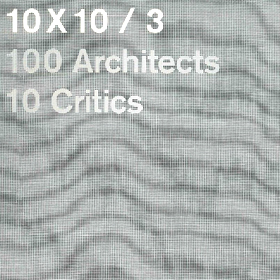
Сентябрь 2009September 2009

«MAYBE THIS IS DUE TO THE CONCEPTUALITY OF THE WORK, IN WHICH EACH DETAIL HAS A SPECIFIC PLACE IN THE WHOLE»«MAYBE THIS IS DUE TO THE CONCEPTUALITY OF THE WORK, IN WHICH EACH DETAIL HAS A SPECIFIC PLACE IN THE WHOLE»
«Boris Bernaskoni got his first international recognition when he won an international competition in 2008 for the Perm Museum of Modern Art that was juried by Peter Zumthor and had participants like Coop Himmelbau, Zaha Hadid and Assymptote. However, regardless of his young age he had been a well-known figure in the Russian architecture scene for over 10 years. For a large part this was the case because he is himself the initiator of many of his projects, that are accordingly often not purely architectural but hoover somewhere between architecture, visual art and design. Examples are the journal a_0, published as a series of 8-page inserts in the leading Russian architecture journal PROJECT RUSSIA, and various installations, such as a tomb for Malevich, a project an office for the presidential, or the design for a new Russian flag. Sometimes these projects have an unexpected spin-off in the real world, for instance when his new flag project became the basis for the design of the background of the Russian Governments Press room. Considering the turbulent development of Russian society, the fact that he is active in so many fields simultaneously is not uncommon– the borders between the professions are very porous, and Bernaskoni proves himself to be versatile in graphic design, visual communication, visual arts, interior design and architecture. In this respect it is quite remarkable that Bernasconi’s work does not include private interiors – a major field of work for young Russian architects. Maybe this is due to the conceptuality of the work, in which each detail has a specific place in the whole. This is hardly compatible with the banalities of the real life of the apartment and its inhabitant. At first glance the work of Bernaskoni could be called minimalist, but it lacks the perfection and ascetic aesthetics of this approach. It would be better to relate his work to conceptual art, which Bernaskoni seems to pick up in an almost instinctive way. It is probably no coincidence that his main body of work is in the design of art exhibitions. A book with his projects and idea’s on this theme, and of course his prize winning project for Perm was recently published, not surprisingly written, designed and produced completely by Bernaskoni himself»
«Boris Bernaskoni got his first international recognition when he won an international competition in 2008 for the Perm Museum of Modern Art that was juried by Peter Zumthor and had participants like Coop Himmelbau, Zaha Hadid and Assymptote. However, regardless of his young age he had been a well-known figure in the Russian architecture scene for over 10 years. For a large part this was the case because he is himself the initiator of many of his projects, that are accordingly often not purely architectural but hoover somewhere between architecture, visual art and design. Examples are the journal a_0, published as a series of 8-page inserts in the leading Russian architecture journal PROJECT RUSSIA, and various installations, such as a tomb for Malevich, a project an office for the presidential, or the design for a new Russian flag. Sometimes these projects have an unexpected spin-off in the real world, for instance when his new flag project became the basis for the design of the background of the Russian Governments Press room. Considering the turbulent development of Russian society, the fact that he is active in so many fields simultaneously is not uncommon– the borders between the professions are very porous, and Bernaskoni proves himself to be versatile in graphic design, visual communication, visual arts, interior design and architecture. In this respect it is quite remarkable that Bernasconi’s work does not include private interiors – a major field of work for young Russian architects. Maybe this is due to the conceptuality of the work, in which each detail has a specific place in the whole. This is hardly compatible with the banalities of the real life of the apartment and its inhabitant. At first glance the work of Bernaskoni could be called minimalist, but it lacks the perfection and ascetic aesthetics of this approach. It would be better to relate his work to conceptual art, which Bernaskoni seems to pick up in an almost instinctive way. It is probably no coincidence that his main body of work is in the design of art exhibitions. A book with his projects and idea’s on this theme, and of course his prize winning project for Perm was recently published, not surprisingly written, designed and produced completely by Bernaskoni himself»